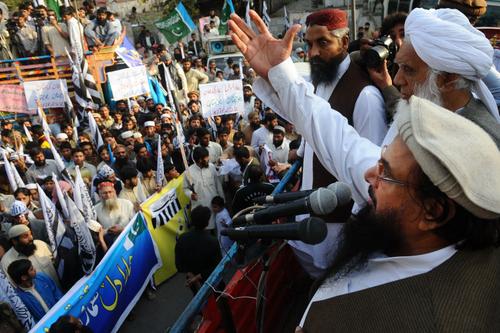For Hafiz Saeed, a US bounty of $10 million is not enough
Here he is! Where’s my $10 million? The US offered a $10 million bounty for information leading to the arrest of Pakistan’s Hafiz Saeed. But the alleged mastermind of the November 2008 attacks on Mumbai is a popular public figure who lives openly in Pakistan — under the protection of the Inter-Services Intelligence agency, India claims.
Washington is either exceedingly clever or incredibly stupid. The trouble is that we're never quite able to figure out which one, because we're never privy to all the information.
Take the recently announced $10 million “bounty” for information leading to the arrest and conviction of Hafiz Muhammad Saeed, the man that India claims heads Lashkar-e-Taiba and masterminded the November 2008 terrorist attacks on Mumbai, as well as countless other operations.
If this announcement is intended to goad or shame the Pakistani authorities to reveal evidence in their possession and put Saeed behind bars, then an IQ test needs to be instituted for America's foreign policy wonks. As Indrani Bagchi puts it in Friday's Times of India:
“The bounty's greatest service in the immediate term will be two things – confine Saeed's movements and sow suspicion in his inner circle. It will make Saeed more dependent on the ISI's protective goodness. It effectively kills Saeed's political career.” But how much does that really mean, if India is correct and the Mumbai attacks were executed on the ISI's behalf? “Saeed occupies a special space in the ISI-sponsored jihad firmament. Saeed has never attacked the Pakistani state or its interests, and he is not a sectarian leader. He has been willing to be used against India and America as and when the ISI has asked. LeT's big stars – Majors Khurram, Haroon, Abdul Rehman etc are all ex-Pakistan army,” Bagchi says.
According to Najam Sethi, editor-in-chief of the Lahore-based Friday Times, the bounty is meant to signal that Lashkar is fair game, given increasing evidence of its direct ties with the remnants of Al Qaeda. But the bounty seems neither necessary nor advisable, given his conclusion that the Pakistani army has far more to lose from a further deterioration of the so-called US-Pakistan “alliance” than the US. Indeed, why should Washington paint itself into a corner, or make threats-billed-as-promises that it is not prepared to keep, when, as Sethi writes in the Daily Mail, “If external relations with America deteriorate, the pipeline for weapons and coalition support funds will dry up and Pakistani soldiers and weapons could even be pitted against NATO forces in Afghanistan.”
As far as this week's news cycle is concerned, Saeed is already probably more popular than Pakistani president Asif Ali Zardari—who as Friday's Hindu reports is seen as a US flunky and an Indofile ready to bend over backwards on the “Kashmir issue.” (Incidentally, I've never fully understood why Kashmir is an issue, apart from the fact that India and Pakistan are always fighting… but then they're supposed to be fighting about Kashmir).
Now, with the added credibility of a US price on his head (and none of the danger, since it's not a bounty in the red-white-and-blue, Clint Eastwood, Dead or Alive sense of the word), Saeed is even more legit. (Seriously: Where would guys like Saeed and Iran's Mahmoud Ahmadinejad be without “the Great Satan” reacting to everything they say like Barbara Bush listening to her first hip hop song? It's like Washington has confused the word and the deed.)
While India was still figuring out whether to cheer or laugh at the bounty announcement, the first thing Saeed did was put together a rally. On Friday, he upped his game at the latest rally of his Pakistan Defence Council (aka Jehadis 'R Us), adding a call for Zardari to cancel his weekend visit to India to the usual opposition to Pakistan resuming its role as staging area for the US military operations in Afghanistan, the Pakistan-based Express Tribune reports.
And now Pakistan has cast a discouraging interpretation on Washington's clarification (as per US State Department spokesman Mark Toner) that the reward is not about finding Saeed's location, but to seek information that can convict the alleged mastermind of the 2008 Mumbai terror attacks in a court of law. What does that mean, Pakistan asks, if it doesn't vindicate the stance that we've held all along: We don't have enough evidence to prosecute him.
In case you haven't noticed, neither Islamabad nor Rawalpindi (home to the shot-callers in Pakistan's army) seem to be feeling the vaunted “US pressure.”
Our coverage reaches millions each week, but only a small fraction of listeners contribute to sustain our program. We still need 224 more people to donate $100 or $10/monthly to unlock our $67,000 match. Will you help us get there today?
